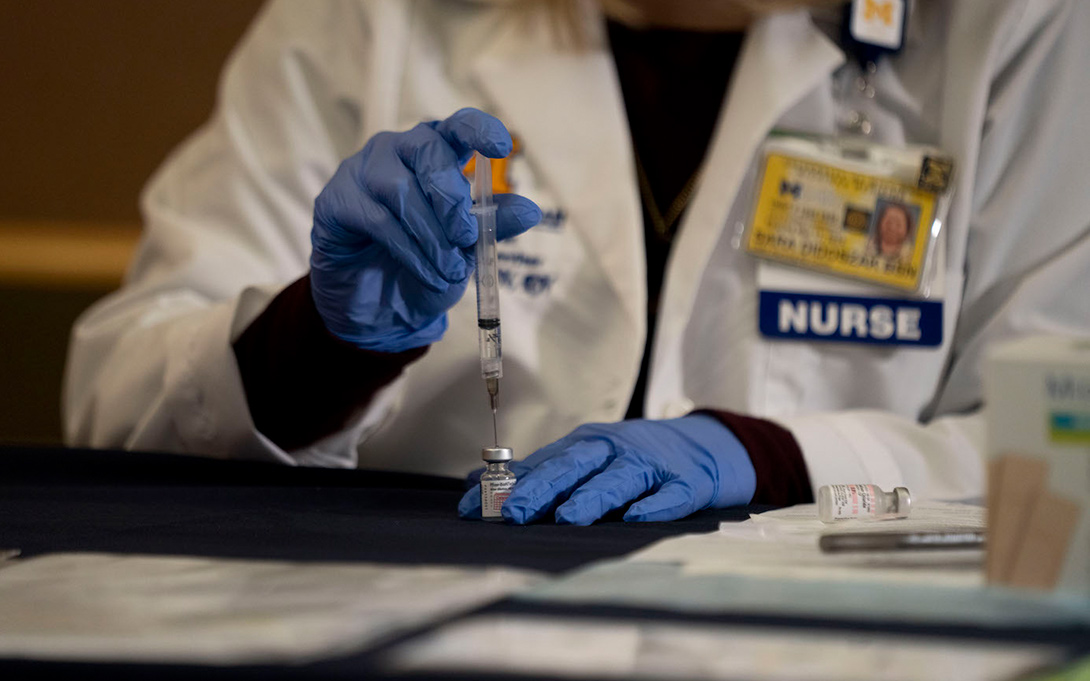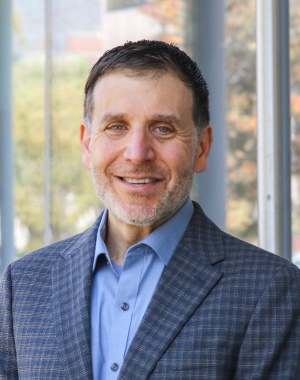
Thirty-eight percent of Detroiters now say they are “very likely” to get the COVID-19 vaccine when it becomes available, up from 14% who gave that response in the fall of 2020, according to a new survey from the University of Michigan.
At the same time, the proportion of those very unlikely to vaccinate fell from 38% to 25%. Overall, Detroiters are split 50-50 on being likely versus unlikely to get the vaccine.
The representative survey of Detroit residents, conducted by U-M’s Detroit Metro Area Communities Study (DMACS), also offers valuable insights on what factors drive Detroiters’ decisions related to the COVID-19 vaccine.
For Detroit residents, the most important factors in determining whether to get vaccinated are their desire to keep themselves, their families, and their communities safe. The least important factors are whether other people they know are getting vaccinated and where the vaccine was made.
The greatest discrepancy between those willing and unwilling to vaccinate is related to how they view science on the effectiveness of the vaccine and the advice of doctors. While 94% of people likely to vaccinate say scientific findings on vaccine effectiveness are important to their decision, just 62% of those unlikely to vaccinate say it is important. Those likely to vaccinate are significantly more likely to think their doctors’ advice is important in deciding to vaccinate (80%) compared to those unlikely to vaccinate (54%).
“DMACS allows us to track how Detroiters’ attitudes about the COVID-19 vaccine have changed over time. Knowing what factors drive their decision making on whether to get the vaccine can inform public health efforts,” said Jeffrey Morenoff, one of the faculty research leads for DMACS, Ford School professor of public policy and sociology, and research professor at U-M’s Institute for Social Research.
DMACS allows us to track how Detroiters’ attitudes about the COVID-19 vaccine have changed over time. Knowing what factors drive their decision making on whether to get the vaccine can inform public health efforts.
Jeffrey Morenoff, faculty lead and professor of public policy and sociology
DMACS has been surveying representative samples of Detroiters since 2016. This latest wave of the survey was open from Jan. 6 to March 5 and captures the views of 2,238 residents. To represent the views of the city as a whole, survey responses are weighted to match Detroits’ population demographics.
This wave of the survey was conducted in collaboration with, and supported by, Michigan CEAL: Communities Conquering COVID (C3), a transdisciplinary partnership of researchers and community leaders that aims to include marginalized communities in COVID-19 research and prevention in order to reduce health inequities across Michigan.
“The community-based participatory research approach of this project has allowed for community input at all stages of survey development, which strengthened the survey and increased the response rate in our community,” said Angela Reyes, executive director of Detroit Hispanic Development Corporation and Michigan CEAL steering committee member.
Disparities persist in who is likely to get the COVID-19 vaccine, according to the survey results:
- Residents of color were significantly less likely to say they plan to get the vaccine than white residents;
- On average, men are more likely to say they will get the vaccine than women;
- Likelihood of vaccination increases significantly with education and income; and
- Residents who say they have no trust in the U.S. government as a source for COVID-19 information are half as likely to plan to get the vaccine compared to those with some trust or high trust in the government.
“The DMACS team and the results of this survey have made important contributions to the mission of the Michigan C3 partnership to understand inequities among Black and Latinx residents in Detroit in the context of the COVID-19 pandemic. We are grateful for and inspired by the findings from this study, which will help inform our work moving forward to address these inequities,” said Barbara Israel, professor of public health and one of the multiple principal investigators for the Michigan CEAL Partnership, along with Erica Marsh, associate professor of obstetrics and gynecology.
DMACS surveys also reveal the impact of the pandemic on Detroit’s neighborhoods. Compared to findings from late 2019, residents now report lower neighborhood satisfaction, increased business closures, and stalled progress on priorities like public safety and beautification.
In late 2019, 20% of residents reported they were very satisfied with their neighborhood, compared to 14% of residents in early 2021. Over that same period, the proportion of residents who noticed more businesses closing than opening in their neighborhoods rose from 15% to 23%.
Roughly a year ago, 30% of residents reported that their neighborhoods were getting safer, but in 2021, only 15% said their neighborhoods are getting safer. Similarly, 39% of residents a year ago reported their neighborhood had grown more attractive, compared to 24% of residents today.
“While we have clear evidence of the toll the pandemic has had on health and economic well-being, the full toll of the pandemic on communities will continue to emerge over time,” said Lydia Wileden, a doctoral candidate at U-M who analyzed the DMACS COVID-19 survey data.
Other notable findings from the latest DMACS survey include:
- Eighty-five percent of residents said in the past week they wore a mask all of the time when in public, 80% said they always wash their hands multiple times a day, and 71% said they are always maintaining a distance of at least 6 feet from non-household members.
- In March, Detroit’s unemployment rate is approximately 26%, which is roughly equivalent to the unemployment rate estimated in October 2020 and more than twice the unemployment rate estimated a year ago, prior to the pandemic.
- The proportion of residents who say the pandemic is creating major challenges accessing healthcare, having a place to live, and getting medication fell significantly between fall 2020 and spring 2021.
See the complete survey results.
More about Michigan CEAL
Michigan CEAL: Communities Conquering COVID (C3) is a transdisciplinary partnership of researchers and community leaders. Together using a community-based participatory research approach, C3 aims to identify and implement effective, community-driven strategies that enhance access and inclusion of marginalized communities in COVID-19 research and prevention to reduce health inequities across the state of Michigan. C3 focuses on alleviating the disproportionate burden of COVID-19 among low-income communities and communities of color in Wayne, Genesee, Kent, and Washtenaw counties. This project is supported by and reflects the goals of the Community Engagement Alliance (CEAL) Against COVID-19 Disparities initiative, funded by the National Institutes of Health, to conduct timely community-engaged COVID-19 research and outreach to reduce health inequities.
This article was prepared by Poverty Solutions and Michigan News.

